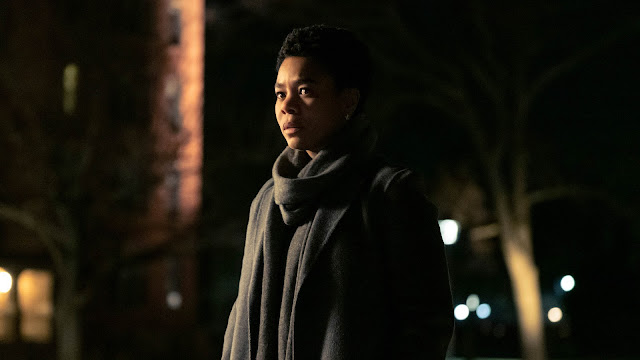Written and directed by Mariama Diallo, and inspired by her own experiences as a student at Yale, Master tells of two Black women struggling to navigate life at a predominately white university ‘as old as the country.’ Their experiences of casual racism, micro-aggression, and tokenism, play out against a backdrop of whispers of an ancient vengeful witch who haunts the campus…
With its combination of shivery supernatural horror and real-life horror, Master is a powerful, unsettling and at times distressing watch. Gail (Regina Hall) and Jasmine (Zoe Renee) not only encounter suggestive supernatural menace lurking in the dark corners of the vast, spooky university buildings, but every-day menace in the form of racist adversity from colleagues and fellow students. Gail has been appointed the first black 'Master' (while it has uncomfortable connotations of slavery, it's an esteemed faculty position overseeing halls of residence) of the university. Tellingly, when she arrives at her new accommodation, the key doesn’t fit the lock and she struggles to gain entry. She wants to make a difference and promote diversity and inclusivity. When we see such promotional events around campus, predominantly attended by white students, it seems to suggest these initiatives are only a form of virtue signalling, real change can only come when fundamental changes occur from within such institutions themselves. Gail’s journey throughout the film sees her gradually realise that she alone cannot change things.
Jasmine, a freshman at the university, is also struggling to settle in. A promising student, she finds herself ostracised by her peers, whose words and actions always seem to hold a nasty, malicious intent. From calling her ‘Beyoncé’ and telling her to clean up a drink she didn’t spill, to screaming the lyrics of a rap song containing the N-word at her in a heavily stylised and stressful party scene, the microaggressions aimed at Jasmine are relentless and eventually take their toll. Little moments and exchanges between Jasmine and other students and staff are peppered with remarks and comments that seem barbed – from the librarian who asks to search her bag, to the cafeteria server whose whole demeanour changes when she sees Jasmine, the effects are quietly distressing. Elsewhere, Diallo’s screenplay explores ideas regarding critical race theory and identity politics, most interestingly with the character of Liv (Amber Gray), and the façade and hypocrisy of diversity efforts versus actual merit.
The horror elements are handled with subtlety and are constantly simmering in the background, threateningly. Slow tracking shots along dark, empty hallways throughout the college buildings and occasional glimpses of a dark, hooded figure stalking stealthily around the campus evoke a quiet sense of menace. An especially creepy moment comes when Jasmine is alone writing an email to her mother and the lights go off in the dorm. As emergency lights flash intermittently along the corridor and she becomes increasingly panicked, we catch a glimpse of a hooded figure lurking in the shadows just behind her. What adds to the power of this scene is the realisation that Jasmine was lying to her mother, telling her that she’s currently enjoying the holiday with her fellow students: she is actually alone on campus as everyone else has gone home, or deliberately excluded her from festive events.
The spectre of the institution’s unresolved past, steeped in racism, continues to impact its present and looms large over proceedings. Gail discovers an infestation of pests in her home, a literal representation of the rotten core of the university and all the old attitudes and bigotries which have clung to it for centuries. Gail finds reminders of this past around her home while being tormented by the eerily ringing servants’ bells in the attic room, as if the ghosts of the past refuse to accept her status as Master. Jasmine becomes obsessed with finding out more about the witch, a woman called Margaret Millet who was burned alive on the site where the campus now stands. When reading up on Margaret in the college library, she learns that the first black student to attend Ancaster had also lived in Jasmine’s room and killed herself by hanging.
With its timely exploration of a university campus haunted by the spectre of racism, Master is a thought-provoking chiller with a lot on its mind. While the more supernatural elements are deliberately ambiguous, Diallo never shies away from exposing the real-life horrors of racism in contemporary American society.

